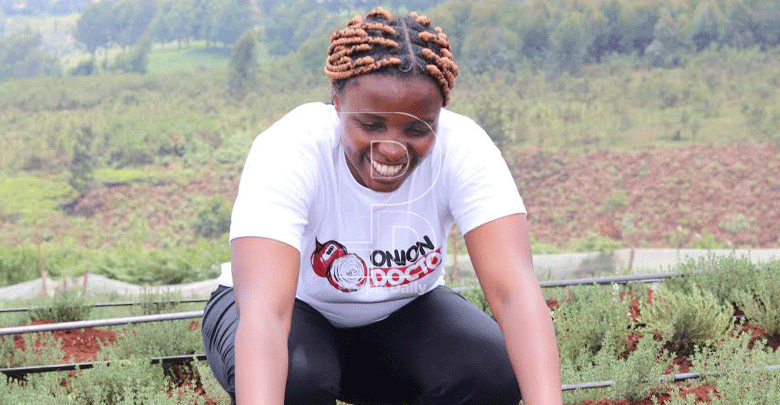Wiping away Kiambu onion farmers’ tears

Milliam Murigi @millymur1
Watching small-scale onion farmers count losses while the farm she was managing was making millions from the same crop is what made Lucy Wangari resign from her job and set up a consultancy firm.
Wangari used to work at Veteran Farm, a production and distribution farm for onions, tomatoes, capsicum among other vegetables and their respective seedlings located in Ndeiya, Kiambu county.
She worked there as a farm manager for three years before quitting to start onion farming and a consultancy firm called Onion Doctor.
“As a farm manager, I used to interact with onion farmers who visited our farms and wanted to know what we were doing differently to remain profitable since a good number of them were counting losses in their ventures.
This is when I realised that there is a gap in the onion farming business, which needed to be filled,” says the 25-year-old agronomist.
And in March last year, just as coronavirus broke into the country, Onion Doctor was founded.
Onion Doctor is an agricultural consultancy firm that offers various services to onion farmers, such as site evaluation, soil testing, professional guidance on onion farming from land preparation, drip irrigation installation, mechanisation, seeds and seedlings, and market linkages.
They walk the journey with their clients with site visits every two weeks. “What is unique about our services is that we are advocating for circular agriculture, also known as low external input farming.
Circular agriculture means that we keep residuals of agricultural biomass and food processing within the food system as renewable resources.
It not only focuses on good yields and the sparing use of resources and energy, but also stresses the importance of putting as little pressure on the environment, nature and climate as possible,” adds the 2016 Land Resource Planning and Management graduate of Jomo Kenyatta University of Agriculture and Technology.
YouTube channel
With a great network of onion farmers, the journey has been smooth so far, and Lucy has been working with about 10 farmers.
However, she says not all farmers she would like to reach can afford her services, therefore, she has started a YouTube channel dubbed Onion Doctor where she handles different topics on onion farming.
So far the channel has about 581 subscribers. “I have realised that different onion farmers are doing many things wrong and this is compromising the quality and quantity of their produce.
Because of this, I have been giving out hacks that can change one loss-making story to a profit-making one,” says a hopeful Lucy.
Green manure
According to her, one of the common mistakes farmers make is using a lot of synthetic fertiliser, which makes their soil more acidic.
Since the onion is a heavy feeder, she says, the more manure you use the better the results and therefore, organic manure usage is preferred.
And for those who don’t have manure in plenty, she advises them to make green manure from the onion waste after harvesting.
“Always use adequate manure in onion farming. Fertiliser should be a supplement or additive.
And always ensure that your manure has fully decomposed for the best results.
For a one acre farm, for instance, use at least two tons to 15 tons of organic manure to ensure your soil remains productive all round,” she offers.
Apart from that, she tells farmers to always ensure that they practise crop rotation to help return nutrients to the soil, interrupt pest and disease cycles, improve soil health by increasing biomass from different crops’ root structures and increase biodiversity on the farm.
However, she warns that not all crops are good for rotation. A complete rotation for onions includes onions, cabbages, and legumes.
She says mono-cropping has been the biggest challenge when it comes to farming.
One should strive to have a weed-free farm since the onion is not a competitive plant.
Market research before embarking on onion farming is vital too. This helps to know the size of the bulb you want and how to space your plants.
Yield and profitability from onion farming in Kenya depend on a number of factors, including variety planted, fertility, geographical location, effects of diseases, and availability of rainfall.
On average, a two and a half acre of red Creole onions (the most common variety) yields up to 17,000 kilogrammes(17 tons) and it takes up to four months from planting to harvesting.
Lucy points out onion thrips, a tiny insect that eats the plant as a big challenge when it comes to farming this vegetable.
Wangari says that farmers should stop spraying only leaves, which is a common scenario in Kenya, but should start spraying both the leaves and the soil.















